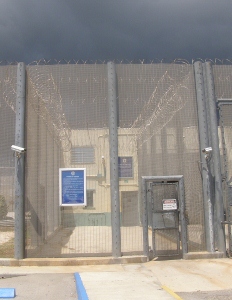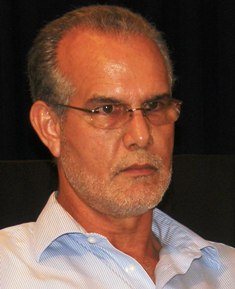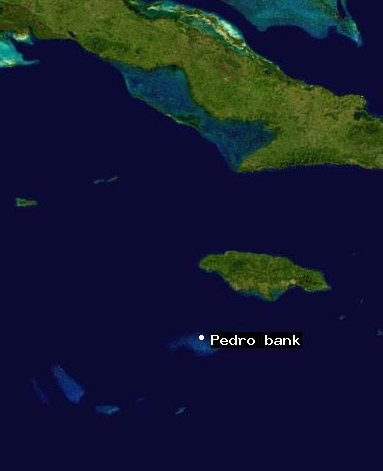Archive for April 2nd, 2012

No treatment for inmates
 (CNS): Although drug and alcohol misuse is prevalent among Northward inmates and many of the prisoners are suffering from serious addiction and dependency issues, none of them are receiving proper treatment during their time of incarceration. A former inmate who has related his experiences and observations of prison life to CNS said that despite there being some 212 prisoners currently in the jail, no more than a dozen inmates ever attend the twice weekly NA/AA meetings — the only support offered for dependency issues. The one-time prisoner explained that rehabilitation at Northward is limited to basic education and sentence planning, which inmates regard as nothing more than a joke.
(CNS): Although drug and alcohol misuse is prevalent among Northward inmates and many of the prisoners are suffering from serious addiction and dependency issues, none of them are receiving proper treatment during their time of incarceration. A former inmate who has related his experiences and observations of prison life to CNS said that despite there being some 212 prisoners currently in the jail, no more than a dozen inmates ever attend the twice weekly NA/AA meetings — the only support offered for dependency issues. The one-time prisoner explained that rehabilitation at Northward is limited to basic education and sentence planning, which inmates regard as nothing more than a joke.
A recent report commissioned by the Portfolio of Internal Affairs by the Institute of Public Administration of Canada (IPAC) also identified myriad issues relating to the rehabilitation of inmates and made many recommendations. It described the rehabilitation programmes at Northward as having been "decimated”, leaving a crucial part of the prison system completely neglected.
“It is unconscionable that the only programme to deal with this issue are the twice a week Narcotics and alcohol anonymous meeting that lasts just one hour,” the inmate revealed, adding that they were held by external volunteers. “The prison has no programme to tackle the leading cause of repeat incarceration.”
The deputy governor has stated that the rehabilitation of prisoners had been sacrificed for security because of a lack of funding. However, things are set for change with the introduction of a director of rehabilitation services, the engagement of several teachers, as well as a new prison chaplain.
Many experts say that rehabilitation, which covers everything from helping prisoners get over drug dependency problems, anger management issues, mental health diagnosis and education, is the only way to address recidivism, which is particularly high in Cayman.
The ex-inmate who spoke to CNS was new to the prison system but he immersed himself in prison life when he was faced with a short sentence for a non-violent offence. Doing what he could to assist prisoners, he said most of them did not take sentence planning seriously.
“Each inmate that comes into the prison is assessed to develop a plan or strategy to avoid re-offending,” the ex-inmate told CNS. “Inmates view this as a joke and only participate to ensure they get parole, early release or transferred to F-Wing. They see no real value in this programme and do not think the prison ‘higher ups’ are committed to helping them.”
The former prisoner said that many of the Caymanian inmates are dejected that the vocational studies facility, which was supposed to include auto repair, electrical and mechanical training, has been sitting empty for years. But one of the major barriers to the sentence planning or any kind of rehabilitation for prisoners is literacy standards.
“Illiteracy is a tremendous problem at Northward,” the ex-inmate said, echoing the comments of many people over the years. However, the only reading programme that exists is a volunteer led class coordinated by Cayman Islands Reading Aides. He explained that there are classes in English, maths, computer studies and art but the inmates have to pay for their exams, and given that they make very little money for the work they do, inmates are discouraged from completing the courses.
Another major problem that faces the prison management is the significant number of inmates suffering from mental health problems which are not addressed. In many cases the prisoners who are alcohol or drug dependent are often self-medicating for an underlying mental health issue.
The ex-inmate revealed that the prisoner allegedly involved in the recent assault on a prison guard, in which the officer had part of his ear bitten off, was at the time the ex-prisoner was incarcerated very obviously suffering from mental health problems.
“Over the past three months we could all see that he was losing it mentally," the ex-inmate revealed, adding that the other inmates refer to those who are breaking down as "chipping off". The former prisoner said his symptoms were quite apparent as he had begun talking to himself and making strange noises. “It was blatant that he needed help,” the former inmate said.
He revealed that the level of anxiety and depression among inmates is alarming and many of the younger prisoners who have severe learning difficulties are exploited by hardened older criminals with whom they are incarcerated. The ex-inmate stated that some offenders are also emotionally, physically and sexually abusing these prisoners after the 9:30 lockdown.
The inmate told CNS that not only is there is little or no treatment but there is little protection either for the prisoners that have real problems which are not being addressed.
The consultants who conducted the recent IPAC report confirmed that offenders with mental illness were not treated for their problems during their period of incarceration. The authors also noted that these offenders often suffer from drug or alcohol addiction as well and that both the mental illness and the underlying addiction had to be treated.
The team rejected suggestions of a Mental Health Court, but recommended a specialized integrated court dealing holistically with the offender.
Highlighting the existing problem, the report found that currently “all the support services serving the Drug Treatment Court are not trained or equipped to deal with offenders with mental illness.”
The chief officer in the Portfolio of Internal and External Affairs recently announced a number of changes to the prison management structure, which are designed to address the problems relating to rehabilitation.
Based on the recommendations of the IPAC report, Kathryn Dinspel-Powell has become the Deputy Chief Officer for Corrections and Rehabilitation, and will now guide the strategic development of rehabilitation services. She will work with key managers and staff in both the prison and the Department of Community Rehabilitation to implement the key recommendations.

Generation Now defends panel line-up
 (CNS): One of the organisers of the recent round table debate hosted by local NGO Generation on one man, one vote has defended the make-up of Thursday night’s panel noting that the views of each member differed on the topic in a number of ways. In an open letter to the media Olivaire Watler faced critics and said that the panel was balanced as each member “approached the discussion from a different perspective, had their own position independent from the other panellists and gave their own reasons for advocating for or against OMOV SMCs” reflecting the current cross-section of views in the Cayman community.
(CNS): One of the organisers of the recent round table debate hosted by local NGO Generation on one man, one vote has defended the make-up of Thursday night’s panel noting that the views of each member differed on the topic in a number of ways. In an open letter to the media Olivaire Watler faced critics and said that the panel was balanced as each member “approached the discussion from a different perspective, had their own position independent from the other panellists and gave their own reasons for advocating for or against OMOV SMCs” reflecting the current cross-section of views in the Cayman community.
Explaining the selection Watler said Ezzard Miller and McKeeva Bush were the first two panellists to be invited. On the night however the premier was replaced by Cline Glidden as Bush was overseas in Cuba on a Cayman Airways retreat.
The Generation now director went on to explain that the opposition leader was invited because although a declared supporter of one man, one vote, he had previously queried the rush to a referendum this year.
Watler said organisers didn’t solicit the views of Adrianne Webb as she was invited as a member of the boundary commission that had done the most recent objective analysis and research on the country’s current political landscape.
Dick Arch, who is a prominent UDP supporter, was invited Watler said, as he had expressed a differingview on the topic from even if he was a supporter of the principle of one man, one vote. “We considered that Mr. Dick Arch’s perspective would be invaluable,” he wrote.
If the goal was merely to have equal numbers of proponents and opponents for one man one vote, single member constituencies, Watler said the organisers could have just asked the premier and Miller to supply two other persons to support their positions.
“The likelihood is that we would have had six panellists but only two perspectives in that scenario and this would have detracted from the richness of the debate,” Watler stated. “We do not consider that artificially selecting an equal number of proponents for OMOV SMCs on the one hand and multi-vote, multi-member constituencies on the other would necessarily have provided a balance of the perspectives in our community or a thorough discussion of the relevant issues which was our objective.”
Facing the critics of the round table discussion in which most members of the audience who spoke also supported the principle, Watler said the event played a significant role in educating the public about the topic but organisers had received feedback from a few persons that they felt the panel was imbalanced.
See letter in full below

Minister says focus on healthy living for fitter old age
 (CNS): Marking this year’s world health day which will be celebrated on Saturday the health minister said that this year’s theme which focuses on aging and health and the need to promote good health throughout one’s entire life fits in with the work going on at the health services authority. Mark Scotland said one of the main objectives of the Be Fit Cayman Campaign is to raise awareness of the link between a healthy lifestyle and the prevention of illness, such as diabetes and heart disease. “This campaign also serves to empower people to make the right choices to live a healthier and more productive life in later years,” he said.
(CNS): Marking this year’s world health day which will be celebrated on Saturday the health minister said that this year’s theme which focuses on aging and health and the need to promote good health throughout one’s entire life fits in with the work going on at the health services authority. Mark Scotland said one of the main objectives of the Be Fit Cayman Campaign is to raise awareness of the link between a healthy lifestyle and the prevention of illness, such as diabetes and heart disease. “This campaign also serves to empower people to make the right choices to live a healthier and more productive life in later years,” he said.
The minister said alongsidethe need to change attitudes, the right kind of medical care is also important in reducing the burden of illness. “The CayHealth programme provides for a coordinated primary healthcare approach, giving people access to a primary care physician, medication care in their community, health education and healthy lifestyles programmes,” he stated. “My ministry is providing critical funding to the Health Services Authority for the CayHealth programme where it is envisioned that a significant reduction in healthcare costs can be realized in the projected future.”
This year’s world health day comes at a time when the world’s population is reaching a first. Over the next five years the number of adults aged 65 and older will begin to outnumber children under the age of 5. This means that those countries which fail to include their senior citizens’ in pro-active and preventative healthcare programmes will see a significant – and maybe even crippling – increase in their health care costs,” Scotland warned.
World Health Day is celebrated on 7 April each year to mark the anniversary of the founding of the World Health Organization (WHO) in 1948. A global campaign each year global leaders and the people around the world are asked to focus on a single health challenge with global impact.
It provides an opportunity to start collective action to protect people's health and well-being and to engage in finding solutions.
Ageing concerns us all young or old, male or female, rich or poor – no matter where we live. WHO’s call to action this year is to promote health across the life course for a happy and productive older age and provide access to basic primary health care, long term care and palliative care.
The Health Services Authority and Public Health Department will host several activities that recognize the importance of maintaining good health for a longer life span.
These include Educational sessions on nutrition, exercise and fitness and stress management under the Be Fit Cayman campaign. The aim is to encourage healthier lifestyle for added and productive years to life. The program is organised for persons who signed up for the Be Fit Cayman educational sessions and those registered under the CayHealth program. It is also open to the public.
These sessions will be held on the following days from 5:30pm – 7:00 pm at the Cayman Islands Hospital, Hibiscus Conference Room located inside the Pink Ladies Cafeteria.
11 & 18 April: Nutrition
24 April & 2 May: Exercise and Fitness
9 & 16 May: Stress Management
Free Health Screenings (for diabetes and hypertension) from 10 – 14 April in all District Health Centres, General Practice Clinic Faith Hospital and Little Cayman Clinic between 9 am and 1 pm and at Foster’s Republic and Hurley’s Grand Harbor on 14 April between 10 am and 2 pm.
For further information contact Therese Prehay Health Promotion Officer at the Public Health Department on 244-2632 and see further details below

Equity in democracy
Several weeks after the launch of the one, man one vote campaign, which is now a few names away from triggering the constitutionally enshrined people’s referendum, it seems that the argument has been won. However, the goal to implement the system for the next election remains elusive. Even though there has been almost no public opposition to the proposal, unless there is a serious ground swell of signatures pushing the petition closer to 7,000 the date that Cayman gets single member constituencies will still be controlled by a reluctant premier.
Following last Thursday’s Generation Now debate, it appears that even members of government are unable to defend the status quo very well. Yet they still have the power to control when the people will get to vote in the way the majority would like.
When McKeeva Bush announced his intention to hold the referendum in May next year, he succeeded in taking the wind out of the sails of the campaign and ensuring that the next election will likely be fought under even greater inequitable conditions than ever before.
Bush is clearly certain that the system still works for West Bay because, while it is obvious he would win whichever of the new West Bay single member constituencies he ran in, the premier cannot be sure his party colleagues would be so successful.
Changing the system creates a further variable that the UDP members cannot be certain of and, given the unpopularity of the current government, some of the incumbents may be concerned that their seats are already injeopardy. Having to fight on their record in a single member constituency may prove very difficult for some — a prospect that they may not relish.
As the constitution does appear to give government the leeway to decide when a people-initiated referendum takes place, securing only 25% of the electorate on the petition is not going to be enough. It will not be able to prevent the 2013 election result being almost entirely in the hands of the capital’s voters, despite what appears to be growing opposition against the idea of the electorate having six votes in George Town.
There is only one way that the people can hope for the next election to be fought on equitable terms and ensure that the next batch of MLAs voted into what will be an even larger legislature are properly accountable, and that is to sign the petition. In order for the next election in Cayman to be fair and democratic, registered voters must show their support by signing their names and in effect turn the petition itself into the referendum.
This would also give the people an opportunity to do their bit for their strapped government and save the Treasury some cash.
The move by the former deputy governor to publicly sign the petition on Tuesday will hopefully encourage reluctant civil servants who, despite the new policy, still fear the repercussions to have the courage to use their new right to sign the petition and support the next step in the development of democratic and accountable government. But there needs to be a real surge of support over the next few weeks. Without it, there will be a long wait to 2017.
All things being equal, since even the premier, who is perhaps one of the few remaining political figures who genuinely supports multi-member constituencies, has conceded that giving six votes to capital’s electors is unfair, the ballot should take place before the next election. But despite his admission that the people should be allowed to decide for themselves what system of election Cayman should have, the premier appears to have no intention of allowing the referendum in November, nor does he appear to be considering simply revising the pending draft order and introducing the single member constituencies for 2013.
What Bush needs to consider, however (and as a wily politician we can assume he has given this some thought), is that to force the people to wait another five years for an equitable voting system is not likely to endear the voting populous to the current government. While Bush himself will almost certainly maintain his seat, his colleagues will be the ones to suffer the consequences. Despite the premier’s own enduring popularity, he will be very unlikely to be in a position to form the next government if his party members are rejected by the voters.
As few of the incumbents will have very much to brag about on the hustings next year when it comes to success in office during this administration, actually implementing the historic change of one man, one vote may in fact be the one thing that could save their seats.
However, with a reluctant premier who, if the speculation is to be believed, has a tight grip on the Cabinet and the party, a revolt in the UDP is highly unlikely. So if Cayman wants democracy now and not later the petition really does appear to be its only hope.
10 lawyers jump ship from Walkersto Maples
(CNS Business): International law firm Maples and Calder (Maples) has recruited 7 partners and 3 associates from its rival Walkers to expand the firm's growing investment funds practice. A release from Maples said the fund experts recruited from Walkers’ Cayman Islands and British Virgin Islands offices would be joining them as soon "as they are free to do so under their existing arrangements". Walkers, which recently announced the sale of its Management Services to Intertrust, said a small number of their partners disagreed with the direction that the firm has taken and decided to leave.” However Walkers noted that the sale “mirrors evolving global financial regulation and an aversion on the part of many major investors to the inherent conflicts that exist where lawyers and investment fund directors are affiliated.” Read more on CNS Business
Datalink licence paves way for CCTV crime project
(CNS Business): A special subsidiary of Grand Cayman’s power company has been granted a licence by the Information and Communications Technology Authority (ICTA) which will enable it to provide fibre optic infrastructure to third parties. The licence will facilitate government’s own CCTV project, enabling the security cameras which have been mounted on CUC poles to send the data and information to the agency monitoring them. DataLink Ltd, which is wholly owned by CUC, holds the licence and not the power firm who owns the poles, but it has now entered into management and maintenance, pole attachment and fibre optic agreements, which have been approved by the Cayman Islands Electricity Regulatory Authority. Read more on CNS Business

Dart wants no dump liability
 (CNS): The Dart Group is hoping to protect itself against any future liability for the George Town landfill when, or if, the developer eventually takes possession of the dump as part of a deal with the Cayman Islands government, sources tell CNS. Under the ForCayman Investment Alliance, Dart is hoping to cap and remediate the current dump when it acquires the site in exchange for land and the development of the first phase of a modern waste management facility in Bodden Town. However, CNS understands that the islands’ largest investor is seeking protection from future problems on the site once it has ownership, evading any liability that could result from those problems.
(CNS): The Dart Group is hoping to protect itself against any future liability for the George Town landfill when, or if, the developer eventually takes possession of the dump as part of a deal with the Cayman Islands government, sources tell CNS. Under the ForCayman Investment Alliance, Dart is hoping to cap and remediate the current dump when it acquires the site in exchange for land and the development of the first phase of a modern waste management facility in Bodden Town. However, CNS understands that the islands’ largest investor is seeking protection from future problems on the site once it has ownership, evading any liability that could result from those problems.
Although there has been no indication about how the Cayman Islands government, which is negotiating the final agreement with Dart, feels about the issue, sources tell CNS that the UK government has raised concerns because of the contingent liabilities it could face under such circumstances.
As part of the proposed and controversial ForCayman Alliance between Dart and government, the developer has committed to building out the residential element of Camana Bay if it can take possession of the capital’s landfill, which is very close to the new town, in order to close, remediate and cap the dump. Dart has then offered to give government a piece of land in Midland Acre and to finance the establishment of what it has said would be a new state-of-the-art modern eco-waste-management park.
The proposal has stirred up considerable local opposition to the move but CNS has learned that there may now be opposition from the FCO because it does not want to see the Cayman government take on the liability of any future hazards such as leeks or explosions, which could cause environmental or other damage, when the old dump is no longer under public control.
The capping and remediation of a landfill, especially one such as the George Town dump, is not without its dangers. Mount Trashmore is not just a large mound of rubbish; it is also a large mound containing an unknown amount and array of toxic chemicals and gases that could cause untold problems in the future.
The Dart group is said to be seeking a way to insure that the developer cannot be held accountable for any unforeseen catastrophe that could occur at the dump, either during the remediation and capping process or afterwards during the monitoring phase of the site.
Dart representatives have also made it clear since the ForCayman Alliance proposal was made public that its future investment in the local economy was dependent on two critical issues: the development of a five-star resort on Seven Mile Beach at the site of the former Courtyard Marriott is dependent on a portion of the West Bay Road being closed in order to make the location a beachfront property, and further development of Camana Bay depends on the closure of the GT landfill.
The revelations about the latest snag on the part of the UK comes against a backdrop of continued public opposition to the proposals and in particular the two deal-breaking issues of the road and the relocation of the dump.
Government has been negotiating with Dart regarding the proposal since early last year but no major agreement has yet been signed. Government is required under the new financial framework agreement with the FCO to undertake a value for money study, which is notyet complete. In addition, as the deal includes a trade of crown land with the developer, there are also certain legislative changes that are required before a deal could go ahead.
Despite this, government has signed a preliminary agreement with the developer to begin work on the Esterly Tibbetts Highway extension into West Bay, which will be needed if government agrees to Dart’s request to close the existing and only road into West Bay.

Former CS boss backs petition
 (CNS): The former deputy governor and retired chief civil servant, Donovan Ebanks, has revealed his intention to sign the petition calling for a people’s referendum on the introduction of one man, one vote. Ebanks plans to put his name to the list publicly outside the town hall in George Town on Tuesday morning. He explained that this was in an effort to encourage all civil servants who support the national ballot on choosing how the electorate will vote for their political representatives to also sign the petition and take advantage of the new policy which allows public sector workers to play a more open part in the country’s democratic process.
(CNS): The former deputy governor and retired chief civil servant, Donovan Ebanks, has revealed his intention to sign the petition calling for a people’s referendum on the introduction of one man, one vote. Ebanks plans to put his name to the list publicly outside the town hall in George Town on Tuesday morning. He explained that this was in an effort to encourage all civil servants who support the national ballot on choosing how the electorate will vote for their political representatives to also sign the petition and take advantage of the new policy which allows public sector workers to play a more open part in the country’s democratic process.
“I want to encourage public servants in particular to seriously consider the issue which the petition seeks to address,” Ebanks said. “If they are supportive of it and feel they wish to participate in the petition, I would like to urge them to exercise their new privilege which the policy recently issued by the deputy governor affords them. I expect that after so many years of uncertainty, many will feel some reluctance to make use of it for the first time.”
Ebanks will also be joined by his former public service colleague, Kirkland Nixon, who was head of the country’s fire service, and he hopes that such a public signing will send a message to government employees that they can participate.
The petition is now very close to the necessary 3,800 names needed to trigger a people-initiated referendum but the greater goal for those spearheading the campaign is to persuade the government to call the referendum this year before the May general election in 2013. This would then enable that election to be conducted under one man, one vote, single member constituencies.
MLA Ezzard Miller, who launched the campaign with MLA Arden McLean a few weeks ago, said that everyone needed to sign the petition in order to make the change to the more democratic process for the next election when the country will be voting in an extra three MLAs.
At present the government has proposed adding one seat to Bodden Town and two in the capital, which would create the unprecedented and inequitable position of George Town voters having a significantly greater influence on the make-up of government than any other constituency.
The position will exacerbate an already unjust electoral system that allows the district in that people live to dictate how much say they have in the democratic process, which the two MLAs representing single member constituencies say is unjust and unacceptable.
The government’s back bench MLA Cline Glidden offered a glimmer of hope to the campaign at the Generation Now debate last week. He suggested that if the campaign were to get close to 50% of the register voters signing the petition, government would have to look at holding the referendum before the next election or rethinking its decision on how the next election will be held without one.
The petition itself asks for a national ballot on the decision in November of this year but the premier has rejected that possibility. McKeeva Bush has offered to hold a referendum on the issue at the same time as the next election to save money. This means Cayman voters will have to wait until 2018 before they are able to vote on a level playing field, despite the significant support for the principle in every poll that has been conducted.
Anyone wishing to witness the former governor sign the petition can join him at 11am Tuesday outside the Town hall by the Legislative Assembly in downtown George Town.

NDC campaign encourages families to seek help
 (CNS): For more than ten years the Cayman Islands has observed April as Alcohol Awareness Month and this year the National Drug Council (NDC) will be focusing on the need to increase public awareness and understanding to help reduce the stigma that too often prevents individuals and families from seeking help. The 2012 Campaign entitled “Healthy Choices, Healthy Communities: Prevent Underage Drinking" will be about informing the public that alcoholism as a chronic, progressive disease, fatal if untreated, and genetically predisposed. Alcohol remains the number one drug of choice among local students.
(CNS): For more than ten years the Cayman Islands has observed April as Alcohol Awareness Month and this year the National Drug Council (NDC) will be focusing on the need to increase public awareness and understanding to help reduce the stigma that too often prevents individuals and families from seeking help. The 2012 Campaign entitled “Healthy Choices, Healthy Communities: Prevent Underage Drinking" will be about informing the public that alcoholism as a chronic, progressive disease, fatal if untreated, and genetically predisposed. Alcohol remains the number one drug of choice among local students.
“The issues of alcohol-related problems and alcoholism are a complex problem, it is one which can only be solved through a sustained and cooperative effort between parents, churches, schools, community leaders, health care providers, employers and young people”, said Joan West-Dacres Executive Director of the National Drug Council.
Although the victims of alcohol-related problems are numerous, the NDC is committed to finding solutions and raising awareness on the problem and the solutions through focused prevention, treatment and recovery.
For over 15 years, the NDC and its affiliates have been a trusted source of help, hope and healing for individuals and families who have been affected by alcoholism highlighting underage drinking.
The NDC says it has developed some very useful resources focused on underage drinking including the Cayman Islands Student Drug Use Survey (CISDUS), which includes detailed research data on prevalence of alcohol, binge drinking, risk factors and correlates of alcohol use.
Until 1998 there were no data or studies available. As a result of on-going research done by the National Drug Council, the Cayman Islands now has comparative data.
Alcohol is the number one drug of choice for Cayman’s young people, more than tobacco or illicit drugs and those who begin drinking before age 15 are four times more likely to develop alcoholism than those who begin at age 18. The NDC found that 37% of those who reported drinking had their first drink at age 11.
For more information contact the National Drug Council at www.ndc.ky or call 949-9000.

Coral reefs mending, but fish stocks declining
 (Jamaica Observer): A group of marine biologists say they have found signs of recovery of Jamaica's depleted coral reefs in the critical fishing resource area known as the Pedro Bank. At the same time, they have warned that there must be proper management of the reefs if it is to be preserved as a food source. The Pedro Bank is a very unique area almost three-quarters the size of mainland Jamaica, most of which is underwater. The bank is composed of sand, coral reefs, deep reefs, seagrass beds, and three coral cays known as the Pedro Cays. It is located approximately 50 miles or 80 kilometres south-southwest of the island and is one of the biggest offshore banks in the Caribbean Basin.
(Jamaica Observer): A group of marine biologists say they have found signs of recovery of Jamaica's depleted coral reefs in the critical fishing resource area known as the Pedro Bank. At the same time, they have warned that there must be proper management of the reefs if it is to be preserved as a food source. The Pedro Bank is a very unique area almost three-quarters the size of mainland Jamaica, most of which is underwater. The bank is composed of sand, coral reefs, deep reefs, seagrass beds, and three coral cays known as the Pedro Cays. It is located approximately 50 miles or 80 kilometres south-southwest of the island and is one of the biggest offshore banks in the Caribbean Basin.
Because of its size and distance from mainland Jamaica and its relatively intact biological systems, it is supposed to be one of the country's last remaining healthy marine ecosystems.
"The reefs in the Caribbean are really in a deep crisis. We've been living in a very stable climate since the last Ice Age and that steady stable climate is starting to change dramatically now. Those corals that have been around for thousands of years in the Caribbean, all of a sudden, they are living in a new environment and being stressed dramatically," said Captain Phil Renaud, Executive Director, Khaled bin Sultan Living Oceans Foundation (LOF).